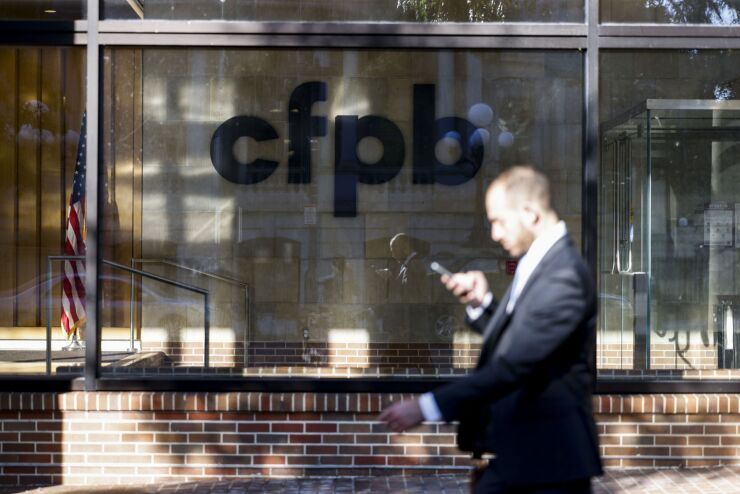
When
The CFPB cited as evidence of discrimination comments by Sturner who
A three-judge panel of the U.S. Court of Appeals for the 7th Circuit heard
The CFPB in February had appealed a U.S. District Court's dismissal of the case in the favor of Townstone. The lower court found that the Equal Credit Opportunity Act applies only to credit applicants — not to prospective home loan applicants. That distinction is written in the statute, experts said, potentially setting the CFPB up for a loss at the federal level.
Consumer groups are concerned that if the bureau loses the case, it would undercut redlining enforcement and potentially destroy the bureau's ability to bring fair-lending cases in Illinois, Indiana or Wisconsin, the 7th Circuit's jurisdiction.
"It's a very important case, and a lot hinges on the treatment of prospective applicants because discouragement is the essence of what drives redlining and leaves people not able to get credit," said Adam Rust, director of financial services at the Consumer Federation of America.
The CFPB already has had its efforts to combat discrimination undercut by industry. In September, the CFPB lost a lawsuit filed
He claims the case is primarily about free speech.
"What we're talking about are a CEO's statements on a radio show — we're not talking about loan applications," said Simpson, who represents Townstone.
The Townstone case could change the dynamic of fair-lending enforcement with the potential for banks to challenge lawsuits brought by the government, experts said. While public policy may favor a broad interpretation of the Equal Credit Opportunity Act, several experts said that the language of the statute is clearly limited to applicants only.
"Over the years, the clear trend has been for federal courts, in interpreting statutes, to focus on the precise language of the law, at least initially," said Paul Hancock, a partner at K&L Gates. "The CFPB is swimming upstream in its approach as the language of ECOA prohibits discrimination against applicants for credit."
Justin Sandberg, a senior attorney at the CFPB, argued that the CFPB has broad authority to "affirmatively discourage" discrimination. He raised the question, hypothetically, of whether a lender could post a 'Whites Only' sign to discourage minorities from applying for loans. The CFPB has argued that it has the authority under the Equal Credit Opportunity Act to broadly prevent such acts of discrimination.
"There's nothing extraordinary about saying that a radio show is directed towards prospective applicants," Sandberg argued. "And it's within the bureau's authority to prevent discrimination in that context. It would be sort of akin to saying, some folks who feel a ''Whites Only'' sign outside the door might not discourage prospective applicants."
The CFPB declined to comment citing pending litigation.
Any lender that posted a 'Whites Only' sign would face a lawsuit from the Department of Justice under the Fair Housing Act, which bars discrimination and prescribes penalties for certain acts of violence or intimidation, Hancock said.
"It is more than naïve to suggest that any business would post such a sign without being challenged under laws that prohibit it," he added.
Richard Horn, co-managing partner at the law firm Garris Horn LLP, said the core problem with the Townstone case is that the CFPB "is far afield from finding discrimination against a mortgage applicant," which is the focus of the Equal Credit Opportunity Act.
Horn, a former senior counsel and special advisor in the CFPB, represented Townstone when it received
"Every other bank has just rolled over on these cases and not challenged the theory that you cannot extend ECOA this far, to people who are not credit applicants," Horn said. "The CFPB has a lot to lose here."
Because Townstone sought to dismiss the case, the CFPB has not conducted discovery to determine if any listeners of the radio show chose not to apply for a loan. Simpson said no borrower had complained about Townstone's lending practices or the statements made by the CEO on the infomercial. In
While it is unclear how the three-judge panel will rule next year, experts said the specific language of the statute may be the deciding factor.
"The bureau has very good arguments that sound public policy justifies a prohibition of discrimination against prospective applicants, and that type of consideration may sway some judges to a decision in its favor," Hancock said. "But the court may conclude that it lacks power to direct public policy beyond the precise language that Congress used in writing the law, even if it were to prefer to do so."






